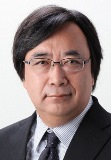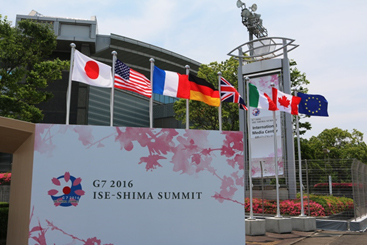 Yasushi Kudo, President, The Genron NPO
Yasushi Kudo, President, The Genron NPO
May 20, 2016
Originally published in CFR's Council of Councils Website
Japan is playing a leading role this year at a number of important multilateral forums. It will join the United Nations Security Council as a nonpermanent member in July, chair the Sixth Tokyo International Conference on African Development in Kenya in August, and chair the Japan-China-South Korea Trilateral Summit in the fall. However, of all its international leadership roles, Japan is attaching the greatest importance to the Group of Seven (G7) Ise-Shima Summit, which will take place on May 26 and 27, and bring together leaders from Canada, France, Germany, Italy, Japan, the United Kingdom, and the United States.
So far in 2016, the G7 has taken a number of important steps in the lead-up to the summit. Japan hosted a foreign ministers' meeting in April in Hiroshima, where the ministers of the seven leading democracies released a joint communiqué agreeing to strengthen cooperation on countering terrorism and addressing challenges in Syria and Ukraine, among others. In addition to the communiqué, the foreign ministers adopted the Hiroshima Declaration on Nuclear Disarmament and Nonproliferation, which calls for renewed cooperation toward nuclear arms reduction and nonproliferation. The May 2015 review conference on the Treaty on the Nonproliferation of Nuclear Weapons (NPT) ended without agreement on an outcome document, primarily due to rifts between nuclear and nonnuclear weapons states. In this context, the G7 foreign ministers' declaration is all the more important, delivering a message from Hiroshima calling for renewed cooperation toward nuclear arms reduction and nonproliferation. Japan hopes to build on this momentum during the Ise-Shima leaders' summit.
Destabilizing International Order and World Economic Risk
In March 2016, the Genron NPO organized two international forums, bringing together noted U.S. and European journalists, in addition to representatives of major think tanks from eight countries. The discussion focused on the unpredictable global economy and the fragile international order. Participants agreed that the world was facing a crisis, where ideals that are the foundation of the G7--namely democracy and the free-market economy--were left without champions. They noted that this was occurring at a time when leadership from the world's major advanced countries was needed to strengthen unity and address the combined risks of a destabilized international order and a still-fragile world economy. The task is even more difficult for the G7 as these uncertainties have bolstered inward-looking isolationist tendencies and populist trends in many countries within and outside the bloc, making it increasingly difficult to facilitate policy coordination in many areas.
The Primacy of the Global Economy
As the host of this year's G7 summit, Japan has proposed an agenda that seeks to expand the scope of the group's traditional economic focus. Tokyo's proposed agenda includes climate change and energy, global health, women's empowerment, and quality infrastructure investment. Despite this broadening, the issue of the global economy will most likely be a primary focus of debate at the Ise-Shima meeting. Major economic disruptions, which have rocked the world's financial markets since the outset of 2016, are showing signs of easing. Meanwhile, economic growth in many countries continues to slow and remains visibly uneven. Depending on their respective economic conditions, stances on monetary policy vary among the advanced countries comprising the G7, greatly affecting the international capital flows.
Meanwhile, slowing economic growth in China, long the driving force of the world economy, especially in the wake of the 2008 financial crisis, will loom above this economic agenda at the G7 summit. A broader slowdown among large emerging economies, including Brazil and Russia, will amplify these concerns. In addition, the geopolitical risks emanating from the Middle East and the much-discussed possible withdrawal of the United Kingdom from the European Union--the so-called Brexit--contribute to global economic uncertainties. Given these trends and expectations, it is likely that global financial markets could once again encounter turbulence. The eyes of the world will be watching for the G7's collaboration on macroeconomic policy; investors in particular will be eager to see if the group can mobilize the requisite fiscal resources to reassure volatile markets.
Transnational Terrorism and the Migration Crisis
Beyond the global economic agenda, the ongoing struggle against international terrorism and the migration and refugee crisis remain major issues in 2016. International collaboration is increasingly required to counter transnational terrorism, a nontraditional security threat for which the G7 has to date struggled to develop a coordinated and appropriately scaled response. As a consequence, the Ise-Shima Summit is set to present an action program to combat international terrorism, but it remains to be seen whether G7 leaders will be able to implement it to defeat this global threat.
The G7 is also expected to take on the problem of refugees and internally displaced people at the summit, a challenge that reached unprecedented levels in 2015 due in large part to the continuing conflict in Syria. Conventional frameworks, stipulated by the Convention relating to the Status of Refugees, also known as the 1951 Refugee Convention, did not anticipate a crisis of the magnitude that we observe today. Moreover, international protective systems appear unable to cope with the scale of the challenge. Just prior to the G7 summit, the UN World Humanitarian Summit (WHS) will convene in Istanbul. Though expectations of the summit have been reduced in light of poor expected attendance and vocal criticism from actors such as Médecins Sans Frontières, the G7 is expected to take a role in supporting the implementation of the commitments that will be agreed to at WHS.
Three Priorities for the 2016 G7 Summit

Given the breadth and scope of the challenges facing the G7, what is required of this year's summit?
First, the G7 member states should reaffirm the importance of democracy, free markets, and other shared values such as human rights and the rule of law, and strive in unison to have these fundamental values prevail broadly in international society. To convey the global appeal and relevance of these values, it is imperative that G7 member countries lead by example and uphold these principles at the domestic level. At the same time, the G7 should display its strong will to stabilize the world economy, take steps to shore up economic growth, and implement structural reforms. The group should furthermore demonstrate a stance in favor of free trade and oppose protectionist impulses.
Second, the G7 states should collaborate further in combating terrorism by increasing information sharing and cracking down on terrorist financing by strengthening regulations. The G7 should also assume a central role in alleviating the refugee crisis and extend support to asylum seekers as well as the countries and local communities hosting them. As part of this effort, the financial commitments made at the February 2016 Supporting Syria and the Region Conference (PDF) in London should be swiftly implemented.
Third, the G7 should assume a leading role and take action to realize the objectives set by the UN Sustainable Development Goals (SDGs) and the Paris agreement on climate change. To achieve these laudable goals, which include reducing income inequality and carbon emissions, G7 countries should establish a framework for providing financing and technical support, in coordination with the private sector, to emerging countries in order to develop and improve their infrastructure, technologies for reducing carbon emissions from power plants, medical and health-care systems, and their capacity for domestic poverty reduction.
Meaningful steps on each of these three priorities would send a strong message that G7 governments are serious about global challenges. Participants of the aforementioned Genron NPO-organized forums agreed that these efforts by the G7 political leaders should be supported broadly by civil society, because governments alone cannot confront global issues such as climate change, terrorism, and poverty reduction. Intellectuals, think tanks, journalists, and other nongovernmental actors must extend a helping hand and identify risks and policy options for governments. Accordingly, the Genron NPO presented an emergency appeal to Japanese Foreign Minister Fumio Kishida, chair of this year's G7 foreign ministers' meeting, which incorporated the opinions expressed at the global forum. In our increasingly unstable world, the G7 is expected to assume a larger role than ever before in addressing a range of global challenges. With the world watching, it will be all the more important for the G7 to deliver a convincing message.
Post a comment